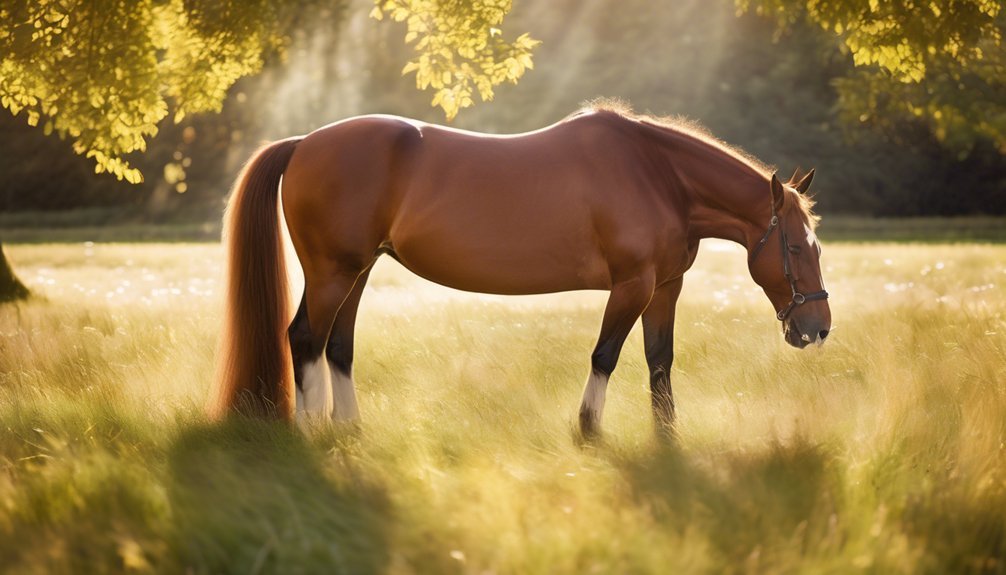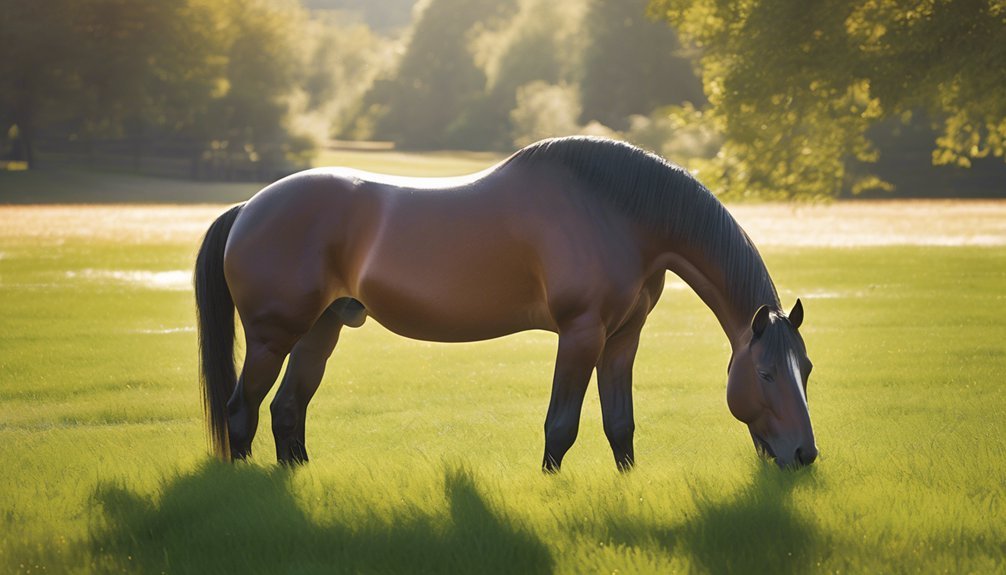
While many horse owners focus on grooming techniques for a shiny coat, the underlying diet, particularly carbohydrates, often goes overlooked. Carbohydrates are essential not only for energy but also for overall coat health and vitality. Understanding how to balance simple and complex carbohydrates can significantly impact your horse's appearance and well-being. Are you aware of how the right carbohydrate sources can transform your horse's coat condition?
Key Takeaways
- Carbohydrates provide essential energy for horses, influencing overall vitality and performance, which directly impacts coat health.
- A balanced intake of simple and complex carbohydrates promotes digestive health, contributing to a shiny and healthy coat.
- Fiber from carbohydrates aids nutrient absorption, supporting skin hydration and elasticity, crucial for maintaining coat condition.
- Imbalances in carbohydrate intake can lead to coat dullness, brittleness, and other health issues, highlighting the need for dietary monitoring.
- Regular assessments of carbohydrate sources and overall diet are vital for ensuring optimal coat health and overall well-being in horses.
Understanding Carbohydrates: The Basics

Carbohydrates play a crucial role in your horse's diet and overall health. They serve as the primary energy source, fueling your horse's daily activities and metabolic functions. Understanding carbohydrate functions is essential for optimal nutrition.
These compounds are classified into simple sugars and complex carbohydrates, which undergo different digestive processes. Simple sugars are quickly absorbed, providing immediate energy, while complex carbohydrates, such as fiber, are broken down more slowly, promoting gut health and stable energy levels.
A healthy balance of carbohydrates helps maintain your horse's weight and vitality, contributing to a shiny coat and overall well-being. By ensuring your horse receives the right types and amounts of carbohydrates, you support not only its energy needs but also its digestive health.
The Importance of a Balanced Diet for Horses
While it may be tempting to focus solely on one nutrient, a balanced diet is essential for your horse's overall health and well-being.
Proper equine nutrition involves more than just carbohydrates; it requires a harmonious blend of nutrients to maintain optimal coat health and vitality.
Here are three key components to consider for dietary balance:
- Protein: Supports muscle development and repair.
- Fats: Provide energy and enhance coat shine.
- Vitamins and Minerals: Promote immune function and overall wellness.
Ensuring your horse receives a variety of nutrients is crucial.
This balance not only keeps their coat vibrant but also supports their overall health.
Types of Carbohydrates: Simple vs. Complex

Understanding the types of carbohydrates is vital for optimizing your horse's diet and overall health. Carbohydrates fall into two main categories: simple sugars and complex starches.
Simple sugars, like glucose and fructose, provide quick energy but can lead to spikes in blood sugar levels if consumed excessively. On the other hand, complex starches consist of longer chains of sugar molecules, offering a steadier release of energy.
These starches are essential for maintaining consistent energy levels throughout the day, which can positively affect your horse's coat health. Including a balanced mix of both types in your horse's diet helps ensure they receive the nutrients necessary for a shiny, healthy coat while supporting their overall well-being.
How Carbohydrates Affect Energy Levels
When you feed your horse the right balance of carbohydrates, you can significantly influence its energy levels and performance.
Understanding carbohydrate metabolism is key to maintaining optimal energy balance. Here are three important ways carbohydrates affect your horse:
- Quick Energy Source: Simple carbohydrates provide immediate energy, perfect for short bursts of activity.
- Sustained Energy Release: Complex carbohydrates break down slowly, offering a steady energy supply for prolonged exercise.
- Recovery and Repair: Adequate carbohydrates help replenish glycogen stores after exertion, aiding muscle recovery.
The Connection Between Diet and Coat Condition

A horse's coat condition often reflects its overall health, and diet plays a crucial role in this relationship.
Dietary influences, particularly the balance of carbohydrates, proteins, and fats, directly affect your horse's coat maintenance. Carbohydrates provide essential energy, but they also support the production of vital nutrients that promote skin health and a glossy coat.
If your horse's diet lacks key elements, you may notice dullness, dryness, or even hair loss. Ensuring a well-rounded diet rich in quality forage and appropriate supplements helps maintain that vibrant shine.
Regularly assess your horse's body condition and coat quality to make necessary dietary adjustments, fostering optimal health and a beautiful coat that reflects the care you provide.
Nutritional Sources of Beneficial Carbohydrates
To maintain a horse's coat health, incorporating beneficial carbohydrates into their diet is vital.
These carbohydrates not only support energy levels but also enhance nutrient absorption, promoting a shiny, healthy coat.
Here are three excellent sources to consider:
- Oat Bran: Rich in digestible fibers, it aids in energy balance and overall gut health.
- Sweet Feed: Often enhanced with molasses, it provides starch sources that improve forage quality and palatability.
- Beet Pulp: A fantastic grain alternative, it offers soluble fibers that help maintain hydration and energy levels.
The Role of Fiber in Skin and Coat Health

Fiber plays a crucial role in maintaining skin and coat health in horses, as it aids in the digestive process and contributes to overall nutrient absorption.
Different fiber types, such as soluble and insoluble fibers, impact gut health, which directly influences coat quality. Soluble fibers, found in beet pulp and oats, help maintain a healthy microbiome, while insoluble fibers from hay and grass promote efficient digestion.
This balance ensures that your horse receives essential nutrients needed for a shiny coat and healthy skin. By incorporating a variety of dietary sources, you can optimize fiber intake, supporting skin hydration and elasticity.
A well-fed horse not only looks good but feels great, enhancing its overall well-being.
Signs of Poor Coat Condition Related to Diet
When your horse's diet lacks essential nutrients, signs of poor coat condition can quickly become apparent. Observing these indicators can help you identify diet deficiencies that impact your horse's coat shine:
- Dullness: A lack of shine often signals nutrient shortfalls, particularly in fatty acids and vitamins.
- Brittleness: If your horse's coat feels coarse or brittle, it may indicate insufficient protein or minerals in their diet.
- Patchiness: Uneven coat growth or bald spots can result from inadequate nutrient intake, reflecting deeper health issues.
Addressing these signs promptly is crucial. A well-balanced diet rich in carbohydrates, proteins, and essential fats not only enhances coat shine but also promotes overall health.
Keep an eye on these signs to ensure your horse thrives.
Tips for Choosing the Right Carbohydrate Sources

Choosing the right carbohydrate sources for your horse is essential for maintaining optimal health and coat condition, especially since carbohydrates serve as a primary energy source.
Start with careful grain selection; opt for high-fiber options like oats or barley that provide energy without excessive sugar content. Avoid grains with high sugar levels, as they can lead to energy spikes and potential health issues.
Look for feeds that incorporate digestible fibers, such as beet pulp or alfalfa, which support gut health and coat shine. Additionally, consider the horse's activity level and age to tailor carbohydrate sources effectively.
The Impact of Carbohydrate Overload on Coat Health
Although carbohydrates are vital for your horse's energy needs, an overload can have detrimental effects on coat health.
A carbohydrate imbalance can lead to various metabolic disorders that may manifest as a dull, brittle coat.
Here are three key impacts of excess carbohydrates:
- Insulin Resistance: Elevated carbohydrate intake may cause insulin resistance, affecting nutrient absorption.
- Laminitis Risk: Overloading on carbohydrates increases the risk of laminitis, which can exacerbate coat issues due to stress on the horse.
- Skin Conditions: High sugar levels can create an environment for skin infections, leading to coat problems like itching and hair loss.
Monitoring your horse's carbohydrate intake is crucial to maintaining not only their energy levels but also the luster and health of their coat.
Frequently Asked Questions
Can Carbohydrates Affect My Horse's Mood and Behavior?
Yes, carbohydrates can impact your horse's mood and behavior. Proper carbohydrate metabolism ensures mood stability by providing consistent energy levels, preventing spikes and drops that might lead to irritability or anxiety in your horse's demeanor.
How Do Carbohydrates Influence the Immune System in Horses?
Carbohydrates influence your horse's immune response by providing essential energy for immune cells. Diverse carbohydrate sources, like oats or hay, can enhance nutrient absorption, supporting overall health and boosting your horse's ability to resist infections effectively.
Are There Carbohydrate Sources That Promote a Shiny Coat?
Imagine a well-groomed horse gleaming in the sun. You'll find that oats, rich in carbohydrates, can enhance your horse's coat health, promoting shiny coats and overall vitality—truly the foundation for a stunning equine appearance.
Can a Horse's Age Affect Carbohydrate Digestion and Coat Health?
Yes, a horse's age can affect carbohydrate digestion. Senior horse nutrition often requires adjustments, as age-related digestion issues may hinder nutrient absorption, impacting overall health, including coat quality and shine. Maintaining proper diet is crucial.
What Are the Signs of Carbohydrate Deficiency in Horses?
If your horse shows behavior changes, like lethargy or irritability, it might indicate a carbohydrate deficiency. Maintaining nutritional balance is crucial; inadequate carbs can lead to energy loss and impact overall health and performance.
Conclusion
In conclusion, if you think your horse can thrive on a diet of hay and the occasional carrot, think again! A balanced intake of carbohydrates is crucial for a shiny coat and overall health. Remember, a horse on a carbohydrate-deficient diet might as well be auditioning for a role in a horror film with a dull, lifeless coat. So, treat your equine friend to the right carbs—because a healthy horse is a happy horse, and who wants a grumpy, unkempt steed?





